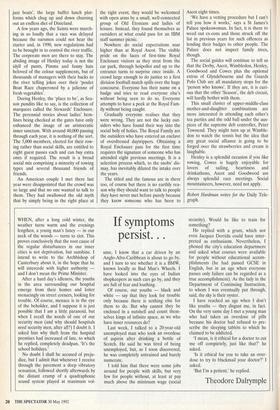If symptoms persist.. .
WHEN, after a long cold winter, the weather turns warm and the evenings lengthen, a young man's fancy — in our neck of the woods — turns to riot. This proves conclusively that the root cause of the regular disturbances in our inner cities is not deprivation, but sunshine. I intend to write to the Archbishop of Canterbury about it, in the hope that he will intercede with higher authority and I don't mean the Prime Minister.
After a hard day's idleness, the youths in the area surrounding our hospital emerge from their homes and loiter menacingly on street corners, looking for trouble. Of course, menace is in the eye of the beholder, and I suppose it is just possible that I am a little paranoid, but when I recall the words of one of our security men (and why should hospitals need security men, after all?) I doubt it. I asked him why theft from the hospital premises had increased of late, to which he replied, completely deadpan, 'It's the school holidays.'
No doubt I shall be accused of preju- dice, but 1 admit that whenever I receive through the pavement a deep vibratory sensation, followed shortly afterwards by the distant crump of a quadraphonic sound system played at maximum vol-
ume, I know that a car driven by an Anglo-Afro-Caribbean is about to go by, and I turn to see whether it is a BMW, known locally as Bad Man's Wheels. I have looked into the eyes of Indian shopkeepers as such cars go by, and they are full of fear and loathing.
Of course, our youths — black and white — say that they look for trouble only because there is nothing else for them to do. But why cannot they be enclosed in a nutshell and count them- selves kings of infinite space, as we who have inner resources do?
Last week, I talked to a 20-year-old unemployed man who took an overdose of aspirin after drinking a bottle of Scotch. He said he was tired of being unemployed, but, as I soon discovered, he was completely untrained and barely numerate.
I told him that there were some jobs around for people with skills, but very few for people without, at least at pay much above the minimum wage (social security). Would he like to train for something?
He replied with a grunt, which not even Jacques Derrida could have inter- preted as enthusiasm. Nevertheless, I phoned the city's education department and asked what courses were available for people without educational accom- plishments (he had passed GCSE in English, but in an age when everyone passes only failure can be regarded as a true accomplishment). As the lady in the Department of Continuing Instruction, to whom I was eventually put through, said, the sky is their oyster.
I have reached an age when I don't like youths — they disgust me, in fact. On the very same day I met a young man who had taken an overdose of pills because his doctor had refused to pre- scribe the sleeping tablets to which he claimed to be addicted..
`I mean, is it ethical for a doctor to cut me off completely, just like that?' he asked.
`Is it ethical for you to take an over- dose to try to blackmail your doctor?' I asked.
`But I'm a patient,' he replied.
Theodore Dalrymple
















































 Previous page
Previous page